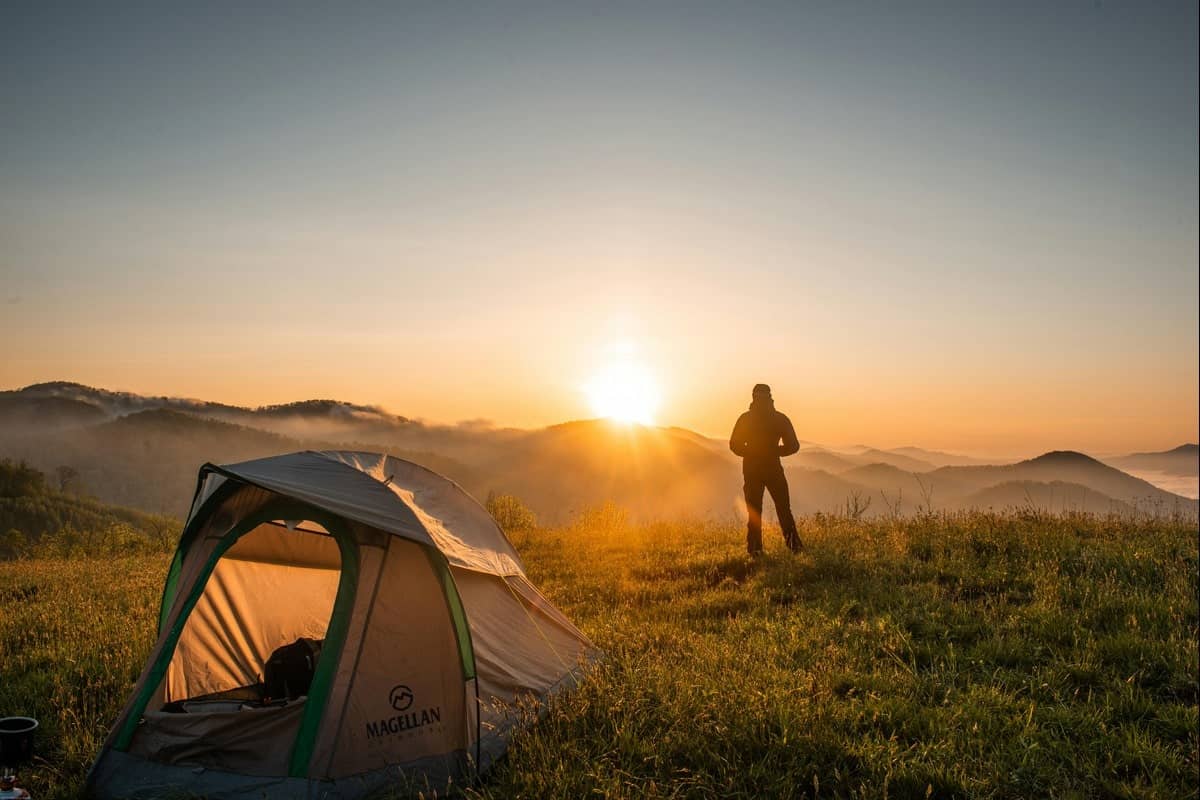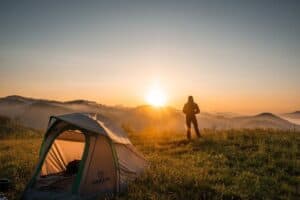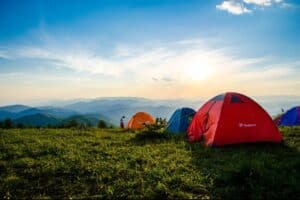There’s something magical about camping in the great outdoors, away from the hustle and bustle of daily life. But have you ever considered going solo? Solo camping can be an incredible experience that allows you to connect with nature in a way that’s hard to achieve when you’re with a group. It can also be a daunting prospect, especially if you’re new to camping or have never camped alone before.
If you’re thinking about embarking on a solo camping trip, you’re not alone. More and more people are discovering the joys of solo camping, whether it’s to challenge themselves, reconnect with nature, or simply enjoy some peace and quiet. But where do you begin? What do you need to know to stay safe, comfortable, and prepared on your solo adventure?
In this beginner’s guide to solo camping, we’ll explore everything you need to know to get started. From selecting the right gear to choosing a suitable campsite, we’ll walk you through the essentials of solo camping. We’ll also cover important safety considerations, such as wildlife encounters, weather changes, and emergency situations. Plus, we’ll share tips on how to make the most of your solo camping experience, from planning your meals to staying entertained.
Whether you’re a seasoned camper looking for a new challenge or a beginner eager to try something new, solo camping can be a rewarding and unforgettable experience. So, grab your backpack, lace up your boots, and join us as we discover the joys of solo camping.
Benefits of Solo Camping
One of the main reasons why solo camping is gaining popularity is because of the many benefits it offers. Here are some advantages of solo camping that you might not have considered:
Increased Self-Reliance When you’re camping alone, you are solely responsible for your well-being and survival. This can be a daunting prospect, but it can also be an empowering one. Solo camping forces you to develop self-reliance and problem-solving skills, as you need to rely on yourself to set up camp, prepare meals, and navigate the wilderness. This sense of self-reliance can translate into other areas of your life, giving you a greater sense of independence and confidence.
Introspection and Reflection Camping alone also provides an opportunity for introspection and reflection. Without the distractions of daily life, you can focus on your thoughts and emotions, and gain a deeper understanding of yourself. This can be a transformative experience that helps you clarify your values, goals, and priorities.
Appreciation for Nature Solo camping can also deepen your appreciation for nature. When you’re alone in the wilderness, you have the chance to observe and connect with the natural world in a way that’s hard to achieve when you’re with a group. You might notice the beauty of a sunset or the sound of a bird’s song in a way you never have before. This appreciation for nature can inspire you to become a better steward of the environment and to advocate for conservation efforts.
Statistics and Personal Anecdotes According to a survey by the Outdoor Industry Association, nearly 30% of camping participants in the United States were camping alone in 2020. This reflects a growing trend towards solo camping as a way to escape from the stresses of daily life and connect with nature.
Many people who have tried solo camping report feeling a sense of accomplishment and self-discovery after their trip. For example, a solo camper named Sarah shared her experience on a camping forum, saying, “I felt like I had accomplished something truly challenging, and I learned a lot about myself in the process. I also came back feeling more connected to nature and inspired to make changes in my life.”
Overall, solo camping offers a unique and rewarding experience that can help you develop new skills, gain self-awareness, and appreciate the beauty of the natural world. If you’re considering a solo camping trip, take the time to prepare properly and be safe, but don’t hesitate to embrace the adventure and enjoy the many benefits it offers.
Essential Gear for Solo Camping
When it comes to solo camping, having the right gear is essential for a safe and successful trip. Here are some items you’ll need to consider:
Shelter Your shelter is one of the most important pieces of gear for a solo camping trip. You’ll want something that’s lightweight, easy to set up, and sturdy enough to protect you from the elements. Some popular options include a backpacking tent, a bivy sack, or a hammock with a rainfly.
Sleeping Bag A good sleeping bag is crucial for staying warm and comfortable at night. Look for one that’s appropriate for the temperatures you’ll be camping in and is lightweight enough to carry on your backpacking trip. Keep in mind that down-filled bags are lightweight and compressible, but can be expensive, while synthetic bags are more affordable but bulkier.
Cooking Equipment When it comes to cooking gear, you’ll want to consider your cooking style, the number of people you’ll be feeding, and the types of meals you’ll be preparing. Some essential items include a stove, fuel, cookware, utensils, and a water filtration system.
Navigation Tools Navigating the wilderness can be challenging, so it’s important to bring the right tools to help you find your way. Some options include a map and compass, GPS, or a smartphone app. Be sure to bring extra batteries or a portable charger to keep your devices powered up.
Choosing the Right Gear When choosing your gear, it’s important to consider your specific needs and budget. Think about the climate and terrain you’ll be camping in, as well as the length and type of trip you’ll be taking. Consider the weight and packability of your gear, as well as the cost. You don’t need to break the bank to have a successful solo camping trip, but investing in quality gear can make a big difference in your experience.
Recommended Products Here are some links to recommended products to help you get started:
- Shelter: ALPS Mountaineering Lynx 1-Person Tent
- Sleeping Bag: TETON Sports Tracker Ultralight Mummy Sleeping Bag
- Cooking Equipment: MSR PocketRocket 2 Stove Kit
- Navigation Tools: Suunto MC-2G Global Compass
Remember, the gear you choose can make or break your solo camping trip, so take the time to research and invest in quality items that will keep you safe and comfortable in the wilderness.
Safety Considerations for Solo Camping
While solo camping can be a rewarding and introspective experience, it’s important to keep safety in mind. Here are some safety risks to be aware of and tips for staying safe while solo camping:
Wildlife Encounters When camping alone, it’s important to be aware of the wildlife in the area and how to avoid potential encounters. Keep food and trash stored securely away from your campsite, and consider bringing bear spray or other deterrents if you’ll be in bear country. Learn about the animals in the area and their habits, and always give them plenty of space.
Weather Changes Weather conditions can change quickly in the wilderness, so be prepared for any situation. Check the forecast before you leave, and bring appropriate clothing and gear for a range of conditions. Stay aware of your surroundings and watch for signs of changing weather, such as dark clouds, high winds, or sudden drops in temperature.
Emergency Situations In the event of an emergency, being prepared can make all the difference. Make sure someone knows your itinerary and expected return date, and carry a communication device such as a satellite phone or emergency beacon. Consider taking a first aid course and bringing a well-stocked first aid kit. Familiarize yourself with the area and know how to access help if needed.
Mitigating Risks To mitigate these risks, proper planning and preparation are key. Research the area you’ll be camping in and familiarize yourself with the terrain, wildlife, and potential hazards. Bring appropriate gear and supplies, including a map and compass, navigation tools, extra food and water, and a reliable shelter. Practice Leave No Trace principles to minimize your impact on the environment and avoid attracting wildlife to your campsite.
Staying Safe To stay safe while solo camping, it’s important to be proactive and aware of your surroundings. Always let someone know your plans and expected return date, and check in with them regularly. Stay alert and watch for potential hazards, and avoid taking unnecessary risks. Trust your instincts and be prepared to adjust your plans if conditions change.
Remember, solo camping can be a rewarding and fulfilling experience, but safety should always be a top priority. By being prepared and proactive, you can mitigate risks and enjoy your time in the wilderness with confidence.
Finding the Right Campsite
Choosing the right campsite can make or break your solo camping experience. Here are some factors to consider when selecting a campsite:
Location The location of your campsite is an important factor to consider. Choose a location that is easily accessible and within your skill level. If you’re new to solo camping, consider a well-established campground with facilities like running water and flush toilets. If you’re looking for a more remote experience, consider backcountry camping in a wilderness area.
Accessibility Consider the accessibility of the campsite. Is it accessible by car, or will you need to hike or backpack in? If you’ll be backpacking, make sure the campsite is within your skill level and that you can comfortably carry your gear to the site.
Amenities Consider the amenities available at the campsite. Do you need access to water, showers, or toilets? Will you need a fire pit or picnic table? Make a list of the amenities you’ll need and choose a campsite that meets those requirements.
Evaluating Potential Campsites To evaluate potential campsites, start by researching the area online. Look for campgrounds or backcountry camping areas in the area you want to explore. Check reviews and ratings to get an idea of what other campers have experienced.
Once you’ve narrowed down your options, visit the campsite before making a reservation. Look for a level, well-draining spot to pitch your tent. Check for hazards like overhanging branches or rocky terrain. Make sure the site is large enough for your tent and any other gear you’ll be bringing.
Choosing the Right Campsite Ultimately, the right campsite will depend on your specific needs and preferences. Consider factors like location, accessibility, and amenities when choosing a campsite. Be sure to evaluate potential campsites in person before making a reservation.
By taking the time to choose the right campsite, you can ensure a safe and enjoyable solo camping experience.
Making the Most of Your Solo Camping Experience
Solo camping can be an incredibly rewarding experience. Here are some tips for making the most of your trip:
Plan Your Meals One of the most important aspects of solo camping is planning your meals. Bring food that is easy to prepare and store, like dehydrated meals, trail mix, and energy bars. Consider investing in a lightweight camping stove and cookware to expand your meal options. Planning and preparing meals can be a relaxing and enjoyable part of the solo camping experience.
Stay Entertained It’s important to have something to do during your downtime. Bring a book, journal, or deck of cards to keep yourself entertained. Consider bringing a camera to capture the beauty of the outdoors. If you’re feeling adventurous, try stargazing or going for a hike.
Embrace Solitude Embrace the solitude that comes with solo camping. Take the time to reflect on your thoughts and feelings. Disconnect from technology and enjoy the peace and quiet. Use the opportunity to learn more about yourself and your interests.
Make Lasting Memories Solo camping can be a transformative experience. Make lasting memories by trying new things and exploring your surroundings. Take a scenic hike or paddle in a nearby lake. Build a campfire and roast marshmallows. Take the time to appreciate the beauty of nature and the freedom of solo camping.
Conclusion Solo camping is a unique opportunity to disconnect from the hustle and bustle of everyday life and reconnect with nature. By planning your meals, staying entertained, embracing solitude, and making lasting memories, you can make the most of your solo camping experience.
Conclusion
Solo camping can be a truly rewarding and transformative experience for those willing to venture out into the great outdoors alone. We’ve covered several key points to keep in mind when planning and preparing for a solo camping trip, including the benefits of solo camping, essential gear to bring, safety considerations, finding the right campsite, and making the most of the experience.
By embracing the solitude, exploring your surroundings, and enjoying the beauty of nature, solo camping can provide a sense of self-reliance, introspection, and appreciation for the world around us. We encourage readers to consider trying solo camping for themselves, and to use the tips and resources provided in this article to plan a safe and successful trip.
If you’re looking for more information on solo camping, we’ve included some additional resources and links for further reading below. Whether you’re a seasoned camper or new to the great outdoors, we hope this article has inspired you to embrace the adventure of solo camping and discover the beauty of nature on your own terms.



